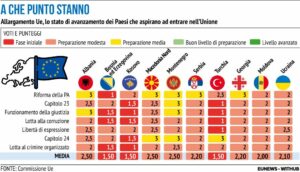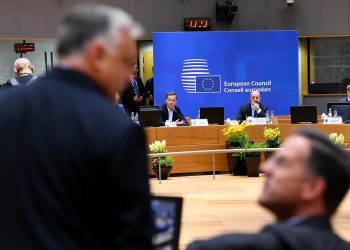Brussels – The future is a step away. However, in between, there is the obstacle of a European Council that, for now, is a hostage to the decisions of a single leader, Hungarian Prime Minister Viktor Orbán. The situation highlights not only the importance of EU enlargement on a geostrategic level – particularly after the outbreak of the Russian war in Ukraine – but, more importantly, the Union’s current difficulties in fulfilling its decades-long promises to the candidate countries while simultaneously carrying out internal reform so as not to distort the Union with the potential entry of 10 new member states in the medium- to long-term future.

The need to focus more seriously on EU enlargement emerged urgently after February 24, 2022, with the demands of Ukraine, Moldova, and Georgia to join the Union. The Russian offensive demonstrated the risks of a continent at the mercy of an imperialist project by Moscow, which would be interested in the annexation of the former Soviet countries and the destabilization with hybrid warfare of what has always represented the black hole of European integration: the six Western Balkan countries (Albania, Bosnia and Herzegovina, Kosovo, North Macedonia, Montenegro and Serbia), which in various forms and at different stages have all already been on the road to EU membership for years. In other words, the project of “peace, democracy and stability on the continent” represented by the European Union – as all leaders of EU institutions keep repeating – cannot materialize if countries that have applied to join, continue to be ignored since the frustration of politicians and citizens (overwhelmingly pro-European) will drive them to seek support in autocratic regimes such as Russia. Serbia’s failure to align with restrictive measures against Moscow and Bosnian Serb secessionism against Sarajevo has been a clear wake-up call. We must acknowledge that the push for EU enlargement is not only a matter of fulfilling promises or anti-Russia. It has also become a real priority for the Union, politically and economically. This is demonstrated first by the series of billion-euro packages in direct and indirect investments in support of all the closest partners – from those for the financial survival of Ukraine to economic growth for the Western Balkans, as well as support against the energy crisis. And then we must remember the new 2030 target, which the president of the European Council, Charles Michel, announced in late August providing, also controversially, a date by which everyone is ready for EU enlargement, inside and outside the Union. While implicitly contesting the setting of a time target in a “merit-based” process, the president of the European Commission, Ursula von der Leyen, also took it a step further in her latest State of the Union speech in September, explicitly linking the EU enlargement process to the reform of the Treaties on which the EU is founded.
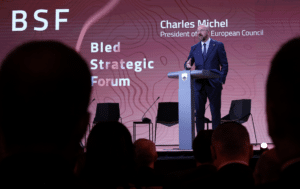
The President of the European Council, Charles Michel (August 28, 2023)
This is the heart of the issue: the process of regenerating the Union by making it able to face future challenges. On the basis of a particularly articulate Franco-German proposal, the 27 EU leaders at the informal Council in Granada began discussing a three-point strategic agenda – future priorities, decision-making system, and joint financing arrangements – that inevitably hold together EU enlargement and treaty reform. In addition to discussions, urgent action is needed because membership requests are already on the table, requiring an immediate response. Among other things, an internal reform could not overlook unanimity and the right of veto in the Council because a Union of 32 States (including candidates who have already started accession negotiations), of 35 (with even those who have received candidate status) or 37 (with everyone in, including Kosovo and Georgia), in which one country can keep the entire joint decision-making system at a standstill, is unimaginable. However, the reform will have to be agreed upon by all current members of the Union, and this is where the whole stage, at the moment, is at risk of failure. Due to different issues, including the fact that funds will have to be redistributed among more countries (especially those of cohesion and agriculture) and the awareness that without the veto right, the weight of each individual country is worthless (in other words, it would no longer be possible to ‘blackmail’ Brussels to get something in exchange for unanimity), some of the 27 Member States show no interest in aligning themselves with this EU ambition, on which the EU enlargement process itself depends. In particular, Orbán’s Hungary has chosen an open obstructionist stance toward the start of accession negotiations with Ukraine and the continuation of funding to Kyiv, as a kind of revenge for the freezing of nearly 30 billion euros in EU funds for failure to uphold the rule of law. The real risk now is that not only will there not be a green light from the European Council scheduled for tomorrow and the day after (Dec. 14-15) for negotiations with Ukraine, but that the entire EU enlargement process will run aground in the most decisive week in years.
How far has EU enlargement come?
.Of the six Western Balkan countries that have begun the long road to EU membership, four have begun accession negotiations -Albania, North Macedonia, Montenegro, and Serbia – one has received candidate status – Bosnia and Herzegovina – and the last has formally applied and is awaiting the response of the 27 Member States – Kosovo. Tirana and Skopje began negotiations in July last year after waiting eight and 17 years, respectively, while Podgorica and Belgrade have been at this stage for 11 and nine years, respectively. Six years after applying for EU membership, on December 15 last year, Sarajevo also became a candidate to join the Union, while Pristina is in the most complicated position after the formal application sent late last year: since the unilateral declaration of independence from Belgrade in 2008, five EU member states -Cyprus, Greece, Romania, Spain, and Slovakia – continue not to recognize it as a sovereign state: the upheaval in EU enlargement.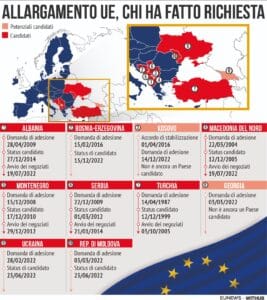 The upheaval in EU enlargement began four days after Russia’s armed aggression when, in the midst of the war, Ukraine applied for “immediate” membership in the Union, with the application signed on February 28, 2022, by President Zelensky. Three days later (March 3), Georgia and Moldova also decided to take the same path, demonstrating the irreversibility of the rapprochement process with Brussels as a clear reaction to the risk that Moscow would erase their independence. On June 23, 2022, the European Council approved the line outlined by the Commission in its recommendation: Kyiv and Chișinău became the sixth and seventh candidates for EU membership, while Tbilisi was recognized as having a European perspective in the EU enlargement process. In the EU Enlargement Package 2023, the Commission recommended that the Council open accession negotiations with Ukraine and Moldova — also with Bosnia and Herzegovina when compliance with accession criteria was achieved — and grant Georgia candidate status. On the other hand negotiations for Turkey‘s accession to the European Union were launched in 2005 but have been frozen since 2018 due to setbacks on democracy, rule of law, fundamental rights, and judicial independence. The chapter on Turkey in the latest Annual Enlargement Package, unveiled in October 2022, stated that the country “does not reverse its course and continues to move away from EU positions on the rule of law, increasing tensions over border respect in the Eastern Mediterranean.” At the NATO summit in Vilnius at the end of June, the Turkish president, Recep Tayyip Erdoğan, tried to force his hand, threatening that he would only bind Sweden’s membership in the Atlantic Alliance when Brussels opens Turkey’s path back to the European Union. The blackmail did not go through, but the dossier on Ankara was addressed in a strategic report affixed in Brussels.
The upheaval in EU enlargement began four days after Russia’s armed aggression when, in the midst of the war, Ukraine applied for “immediate” membership in the Union, with the application signed on February 28, 2022, by President Zelensky. Three days later (March 3), Georgia and Moldova also decided to take the same path, demonstrating the irreversibility of the rapprochement process with Brussels as a clear reaction to the risk that Moscow would erase their independence. On June 23, 2022, the European Council approved the line outlined by the Commission in its recommendation: Kyiv and Chișinău became the sixth and seventh candidates for EU membership, while Tbilisi was recognized as having a European perspective in the EU enlargement process. In the EU Enlargement Package 2023, the Commission recommended that the Council open accession negotiations with Ukraine and Moldova — also with Bosnia and Herzegovina when compliance with accession criteria was achieved — and grant Georgia candidate status. On the other hand negotiations for Turkey‘s accession to the European Union were launched in 2005 but have been frozen since 2018 due to setbacks on democracy, rule of law, fundamental rights, and judicial independence. The chapter on Turkey in the latest Annual Enlargement Package, unveiled in October 2022, stated that the country “does not reverse its course and continues to move away from EU positions on the rule of law, increasing tensions over border respect in the Eastern Mediterranean.” At the NATO summit in Vilnius at the end of June, the Turkish president, Recep Tayyip Erdoğan, tried to force his hand, threatening that he would only bind Sweden’s membership in the Atlantic Alliance when Brussels opens Turkey’s path back to the European Union. The blackmail did not go through, but the dossier on Ankara was addressed in a strategic report affixed in Brussels.
How to join the European Union
.
The EU enlargement process begins with a non-EU state submitting a formal application for membership to the rotating presidency of the Council of the European Union. Union membership first requires passing an exam of the Copenhagen criteria (established at the European Council in the Danish capital in 1993 and strengthened by the EU leaders meeting in Madrid two years later). These criteria are divided into three groups of basic requests that the Union addresses to the country that has applied for membership: rule of law and democratic institutions (including respect for human rights and the protection of minorities), stable market economy (ability to cope with market forces and competitive pressure), and fulfillment of its obligations (effectively implementing the body of EU law and meeting the objectives of political, economic and monetary of the political Union).union).
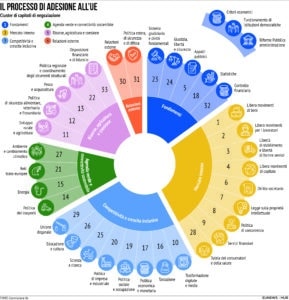 Having obtained the favorable opinion of the Commission, the conferment of candidate country status comes with the approval of all members of the Union. After this, the Commission recommends to the EU Council to open negotiations that, again, require the unanimous go-ahead of the member countries: this allows to open negotiating chapters (varying in number), the purpose of which is to prepare the candidate, particularly on the implementation of the necessary judicial, administrative and economic reforms. Upon completion of negotiations, and when EU enlargement is possible in terms of absorption capacity, the Accession Treaty is signed (with terms and conditions for accession, including any safeguard clause and transitional provisions), which must first be approved unanimously by the European Parliament and the Council. A parallel and separate process applies for the Western Balkans for the EU accession negotiations, which, however, impacts EU enlargement. The stabilization and association process aims to help the Balkan partners for eventual accession through political and economic objectives that stabilize the region and create a free trade area. After establishing a general framework of bilateral relations between the European Union and the partner country the Stabilization and Association Agreement is signed, offering the prospect of accession.
Having obtained the favorable opinion of the Commission, the conferment of candidate country status comes with the approval of all members of the Union. After this, the Commission recommends to the EU Council to open negotiations that, again, require the unanimous go-ahead of the member countries: this allows to open negotiating chapters (varying in number), the purpose of which is to prepare the candidate, particularly on the implementation of the necessary judicial, administrative and economic reforms. Upon completion of negotiations, and when EU enlargement is possible in terms of absorption capacity, the Accession Treaty is signed (with terms and conditions for accession, including any safeguard clause and transitional provisions), which must first be approved unanimously by the European Parliament and the Council. A parallel and separate process applies for the Western Balkans for the EU accession negotiations, which, however, impacts EU enlargement. The stabilization and association process aims to help the Balkan partners for eventual accession through political and economic objectives that stabilize the region and create a free trade area. After establishing a general framework of bilateral relations between the European Union and the partner country the Stabilization and Association Agreement is signed, offering the prospect of accession.
Find more insights on the Balkan region in the newsletter BarBalcani hosted by Eunews
English version by the Translation Service of Withub
